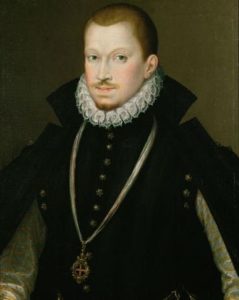1578
Alcazar, the Battle of Three Kings
Christian crusades against Islamic powers were not confined to the Holy Land. An example of this is the expedition launched by the doomed Portuguese king Sebastian against the sultanate of Morocco, a sortie that had profound repercussions in a number of countries.
Sebastian I (1554-78) acceded to the throne of Portugal at the age of three. This was a time of great national prosperity brought by the wealth of Asian, African and Brazilian trade outposts; the Portuguese had developed a commercial empire that stretched around the world. Sebastian, despite his youth, proved to be a competent and charitable king, reforming laws, establishing hospitals and shelters and encouraging the fair treatment of colonial natives. He was also a very pious Christian, the product of a Jesuit education; he is said to have carried a copy of the writings of Thomas Aquinas with him at all times.
Was it this piety that led him to fear contact with women? Was it the fact that his mother abandoned him shortly after his birth to return to Spain to become Regent, never to see him again? Or was it the result of sexual abuse at the hands of a paedophile as a recent history of the king has suggested?* Whatever the cause, Sebastian assiduously avoided his royal duty to marry and continue his dynastic line. He channeled his energy into dreams of martial success and when presented with a chance to invade the land of Islam and battle the enemies of Christendom he seized the chance.
It was in the national interests of Portugal that the sultanate of Morocco not be too powerful or fall under the control of the Turkish empire which was expanding its influence along the coast of North Africa. In 1576 the sultan Abdallah Mohammed II was deposed in a palace coup. He fled to the Iberian peninsula where he sought the aid of the kings of Spain and Portugal to regain his throne in return for promises of good relations. Spain sent only a battalion of volunteers but Sebastian mounted an expensive expedition containing the cream of Portuguese nobility, mercenaries, and a curious group of English Catholics who had intended to invade Ireland at the behest of the pope.
Sebastian’s force landed in Morocco where he was joined by the troops of Abdallah and together they marched inland. At Alcazar (aka Alcacer Quibir, aka Alcazarquivir) these forces met the much larger army of Abd al-Malik I who had summoned a jihad to confront the invader. Outnumbered by 3 to 1, Sebastian’s forces were overwhelmed. He was killed as were Abdallah and Abd al-Malik. Thousands of Portuguese were taken prisoner and were either enslaved (if poor) or were subject to costly ransom. Sebastian’s body (or what was purported to be his corpse) was also ransomed but there were many doubts expressed as to whether it really was the king.
Before the expedition, Philip of Spain remarked, “if he succeeds, we shall have a fine nephew, if he fails, a fine kingdom.” The throne of Portugal passed from the childless Sebastian to an aged uncle who was a Catholic cardinal, resulting in a succession crisis that saw Philip within a few years seizing the country and its empire. Portugal was devastated financially by the cost of the ransoms as well as the Spanish takeover. Moreover, imposter after imposter appeared, each claiming to be the young king and setting off more political turmoil.
* Harold B. Johnson in “A Pedophile in the Palace: or The Sexual Abuse of King Sebastian of Portugal (1554-1578) and its Consequences” says that the king’s Jesuit confessor, Padre Luis Gonçalves da Câmara, was most probably the child molester who infected the boy with gonorrhea.
